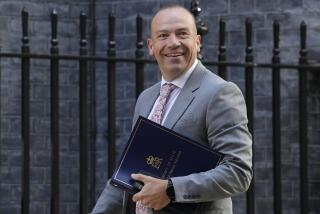IRA Calls Off Plan to Give Up Arms
- Share via
LONDON — The Irish Republican Army on Tuesday called off its latest plan for giving up its weapons, throwing the Northern Ireland peace process into yet another tailspin and triggering a fresh round of recriminations by the British province’s feuding political parties.
The decision by the outlawed paramilitary group came a day after Colombian authorities announced they had arrested three alleged IRA members on suspicion of training leftist South American rebels in the art of explosives.
The arrests and the IRA arms announcement were seen as a double setback for the Northern Ireland peace process. Both events caused diplomatic headaches for disappointed British and Irish government officials, in part because they fueled Protestant suspicions about the IRA’s commitment to the 1998 Good Friday peace accord.
That agreement seeks to end decades of violence pitting the province’s Roman Catholics, who wish to join Ireland, against Protestants, who want to remain part of Britain. The conflict is estimated to have claimed 3,600 lives.
Efforts to fully implement the accord, however, have repeatedly been frustrated by the issue of the IRA’s weapons and other matters.
Sinn Fein, the IRA’s political arm, found itself in the embarrassing position Tuesday of having to explain what three suspected IRA members were doing in Colombia. When asked at a news conference in Belfast, the provincial capital, whether the men were known republicans--as those who seek unity with Ireland are called--Sinn Fein Chairman Mitchel McLaughlin replied: “Yes, some of them certainly are, and they would be known to the media.
“But I think the issue is whether this has anything to do with the Irish peace process at all,” he said. “I think there is no basis for coming to that conclusion.”
The men taken into custody include Martin McCauley, who was seriously wounded in a 1982 attack by an anti-terrorist unit of the Royal Ulster Constabulary, the overwhelmingly Protestant police force in the province, security sources said. McCauley later received a two-year suspended sentence for possession of a firearm.
A second suspect, James Monaghan, received a three-year sentence in a Dublin court in 1971 for conspiracy and possession of explosives. Monaghan was identified as a prominent member of the IRA by a Protestant politician this year in Britain’s House of Commons and the Northern Ireland Assembly.
Security sources in Northern Ireland suggested Tuesday that the men may have ties to the IRA’s so-called engineering department, which specializes in bomb making and weaponry, and that they may have traveled to Colombia to explore bomb technology.
The IRA made no mention of the arrests in its statement explaining why it decided to pull out of a recent agreement it had reached with an independent disarmament commission on a method for disposing of its weapons. The group instead split blame for its decision between its Protestant rivals and the British government. The latter infuriated the IRA last weekend by temporarily revoking the power of the Northern Ireland Assembly.
“The subsequent action of the British government, including their failure to fulfill their commitments, is also totally unacceptable,” the IRA said. “The conditions therefore do not exist for progressing our proposition. We are withdrawing our proposal.”
The IRA stopped short of threatening to cut off communication with the disarmament commission.
John Reid, Britain’s secretary for Northern Ireland, voiced disappointment over the reversal.
“I think it’s calculated to encourage skepticism, and that can’t be good for the process,” said Reid, who nonetheless added that the peace process remained intact and vowed to press ahead.
Indeed, Michael McGimpsey, a leading politician with the Ulster Unionist Party, the province’s largest Protestant party, described the IRA action Tuesday as “tactical maneuvering” designed to put pressure on Reid or force new elections in the province.
Members of the Ulster Unionists appeared equally critical of the apparent link between the IRA and Colombian guerrillas, charging that this new issue poses a huge challenge for the British and Irish governments.
“Everybody knows these individuals did not go to the jungle of south Colombia to get a suntan,” said Reg Empey, the Ulster Unionists’ senior negotiator and acting first minister of the Northern Ireland Assembly. “They went there to develop and test weapons systems.”
Key Protestants are refusing to participate in Northern Ireland’s power-sharing government until the IRA gives up its weapons. But disarmament is unlikely to occur until Catholic demands on a series of key reforms, including a revamping of the police force, are met.
Times special correspondent William Graham in Belfast contributed to this report.
More to Read
Sign up for Essential California
The most important California stories and recommendations in your inbox every morning.
You may occasionally receive promotional content from the Los Angeles Times.













